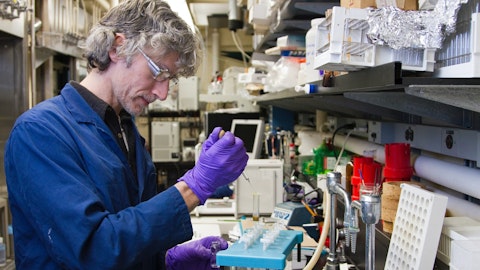Steven R. Miller: I just want to add one comment about the medical sales liaisons as well. I mentioned during earlier part of the call that we are adding up to six medical sales liaisons, who will be doing a lot of efforts to educate the physician community on FYCOMPA, particularly the safe use of FYCOMPA.
Pete Stavropoulos: Alright, thanks. Second question I have is what’s the potential for developing FYCOMPA in rare epilepsy indications?
Patrick J. McEnany: Yes. We are not — this is Pat. Thanks for the question. We’re really not prepared to talk about that at this point. We’re, right now, just getting our arms around the program and the full opportunity to look at rare epilepsies. There was a paper published recently, which Steve referred to, in Epilepsia, which is available online. I suggest that you take a look at that. But I think we’ll have a lot more to say when we have our first quarter call in May with regard to the other opportunities that — where FYCOMPA can be successfully used as a treatment of rare diseases.
Steven R. Miller: One thing I also want to add to that, FYCOMPA has a very broad label for the treatment of epilepsies, and many of the rare epilepsies fall into that category. In other words, the patients exhibit the epilepsy characteristics that are consistent with the product label. So our MSL team will be educating the physicians on which specific types of genetic epilepsies that fall within the product label can be successfully treated with FYCOMPA.
Pete Stavropoulos: Alright, thank you. Thank you for taking our questions.
Operator: Thank you. Our next question comes from Joon Lee with Truist Securities.
Unidentified Analyst: Good morning. This is Les on for Joon. Thank you for taking my questions. First question is for Jeff. Could you quantify how many antibody tests were provided and utilized by physicians perhaps in 4Q and how has that trended? And then specifically in the small lung cancer patient population, what drivers would push for that additional testing?
Patrick J. McEnany: Les, thanks for the question. I’ll turn that over to Steve.
Steven R. Miller: We haven’t actually provided any specific numbers of patients who are treated with the antibody test. However, it is increasing significantly. We have visibility to how the test is being utilized, we buy that data from the test providers. And it has been increasing significantly.
Jeff Del Carmen: And I’ll add to that, too. What we did see starting in the fourth quarter of 2021, you did see a significant increase in the number of BGCC testing done, and then you saw that number carry through 2022. So we’re seeing consistent high levels of the BGCC tests that are done when compared to previous years. As far as the small cell patients, our approach is to be working with the top small cell academic institutions and to put that in the protocol, so that when a small cell lung cancer patient gets diagnosed that there’s a paraneoplastic panel that’s done, which includes the BGCC antibodies. So that’s our approach and more of a top-down approach.
Unidentified Analyst: That is helpful, thank you for that. Perhaps with Steve, it appears the reasoning on the 100 milligram dose is primarily from patient feedback. Other than safety, what data do you plan to present to the regulators and essentially, what does the higher dose impact your pricing strategy?




